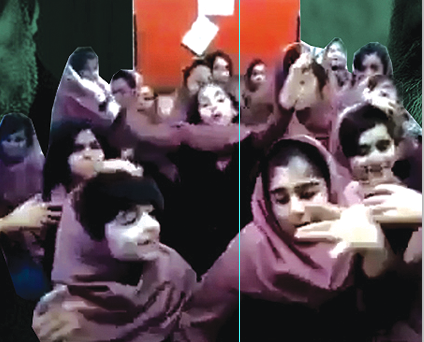May 17, 2019

The Iranian government has launched an investigation into “disturbing” videos showing schoolgirls dancing to a pop tune recorded by an Iranian-American singer, Sasy.
Education Minister Moham-mad Bat’hai said a three-person team had been appointed to locate the source of the videos. The most frequently circulated one lasts 45 seconds and shows girls in three different schools dancing to the song and singing along. In one of the clips, an adult woman can be seen swaying along with the girls.
At least one video shows grammar school buys dancing and being led by a 20-something woman.
“The enemy is trying different ways to create anxiety among the people, including by spreading these disturbing videos,” the minister said. “I’m certain there’s some kind of political plot behind the publication of these devious videos in schools.”
The girls are taking part in an online dance challenge to the song “Gentleman,” according to the Center for Human Rights in Iran.
Videos of dancing children were also posted by the singer on his own Instagram page in defiance of criticism from deputies in the Majlis.
After Deputy Speaker Ali Motahari called for the principals of the schools to be sacked, Sasy sassily invited the politician to take part in the challenge, and then suggesting he should focus on more important issues than kids dancing.
“Seriously, you left the dollar, meat, high prices … and decided about Gentleman?” wrote the singer, who has more than 2 million followers on Instagram.
Sasy Mankan, born Sasan Heydari-Yafteh, is a 30-year-old singer and songwriter born in Ahvaz. He has been performing since 2007 and moved to the United States after the disputed 2009 presidential election in Iran. The news agency Reuters called him one of Iran’s best-known underground rap singers. His newly released album, “Gentlemen,” challenges listeners to dance.
The Center for Human Rights in Iran (CHRI) said many Iranians condemned the education minister’s response to the videos, but he shot back by arguing that the videos are part of a plot to undermine the Islamic Republic. “Deception or infiltration?!” he tweeted.
Ayatollah Abbas Kabi, one of the 12 members of the Council of Guardians, also called for school officials to be prosecuted, claiming the videos were “part of the enemy’s cultural war” against Iran.
In another post, Sasy responded: “Did not you think about one day talking about Friday prayers? This song is listened to once in school and thousands of times in homes…. Get to the big trouble of the country.”
The Fars news agency, affiliated with the Pasdaran, also expressed concern over the videos. “At first glance, seeing children’s joy brings joy. But when we look carefully at what they’re shouting in unison, we feel ashamed and concerned for an education system that has no oversight over these issues,” Fars wrote.
Fifty-one student Basij groups also condemned the dancing in schools while calling on the Education Ministry to identify and act against the principals of the schools that allowed the dancing to take place.
“How did the attitudes and beliefs of the students and children of this land become infected with these anti-Islamic and immoral thoughts and improper behavior?” the groups asked in a statement published by Iranian media.
Some commentators pushed back. On May 8, writer Soudabeh Sadri asked why the authorities are focused on policing happiness when Iran is facing much bigger problems.
“‘Gentleman’ is not just a song. It’s a siren heralding the defeat of those in charge of Iran’s cultural and artistic affairs in the past few decades,” she wrote in an op-ed published by the Reformist Asr Iran newspaper.
“In these depressing times, when we are constantly hearing about increases in the prices of goods, is it really a priority to prevent students from having fun?” she asked. “Can’t they be merry just for a few minutes, be it with a song by an Iranian singer in Los Angeles?”
Some took to Twitter to condemn the authorities’ response to the dancing videos.
“The day when our religious people show as much anger toward corruption and theft of public funds as they do toward dancing and merriment by a few students in school is the day there will be hope that the country could get back on its feet,” tweeted journalist Seraj Mirdamadi.
Peyman Moqaddam tweet-ed, “They want to mobilize the whole country to find out which school started the Sasy Mankan singing challenge! But at the same time, they blame others for swelling inflation, corruption, lawlessness and incompetence. May God cure your insanity, although it’s doubtful.”
Dancing is not a new problem in the eyes of some authorities. In 2014, seven Iranians were sentenced to six months in prison and 91 lashes, suspended for three years, for making a video in which they danced on a rooftop to the Pharrell Williams song “Happy.”
Last year, an Iranian teenager posted videos of herself dancing in her bedroom. Maedeh Hojabri, an 18-year-old gymnast, was forced to issue an apology on state TV.
The education minister said the investigation into the latest videos would ensure that “public trust and beliefs of the religious people in relation to the education system are not compromised.”
He added that arrangements would be made to “strengthen prayer” in schools, adding: “The only thing that can save students from danger is prayers in schools.”



















